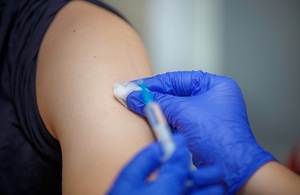New measures to support roll-out of vaccines in the UK
New laws will allow more healthcare workers to administer flu and potential COVID-19 vaccines safely to the public.

- More healthcare workers will be trained to administer flu and COVID-19 vaccines safely to public
- Changes will help the UK-wide deployment of vaccines once they have been approved by the regulator
- Vaccines will only be given to patients once proven to be safe and effective
New laws allowing more healthcare workers to administer flu and potential COVID-19 vaccines have been introduced, the government announced today.
The measures aim to save thousands of lives by increasing access to vaccines against potentially killer diseases. They will also support the government’s plans for the roll-out of a potential COVID-19 vaccine that is proven to be safe and effective through robust clinical trials and approved for use by the regulator.
Following a public consultation, changes to the Human Medicines Regulations 2012 will come into force today (Friday 16 October 2020) which will:
- enable the expansion of the trained workforce who can administer COVID-19 and flu vaccines to improve access and protect the public. This will begin with those who already have experience in handling vaccinations but may currently work outside of NHS settings, such as independent nurses, allied healthcare professionals, paramedics, physiotherapists, pharmacists and student nurses and doctors. The expanded workforce will undergo a robust training programme to ensure patient safety is upheld to the highest standards
- implement reinforced safeguards to support the Medicines and Healthcare products Regulatory Agency (MHRA) to exceptionally grant temporary authorisation, pending the granting of a licence, for new vaccines and treatments needed to tackle public health threats - provided they meet the highest safety, quality and effectiveness standards and there’s a significant public health justification for doing so
Health Secretary Matt Hancock said:
The NHS has vast experience in vaccinating millions of people against diseases every year.
These legal changes will help us in doing everything we can to make sure we are ready to roll out a safe and effective COVID-19 vaccine as soon as it has passed clinical trials and undergone rigorous checks by the regulator.
We will be able to increase the number of fully trained and experienced healthcare professionals to administer COVID-19 and flu vaccines under NHS and local authority occupational health schemes, as well as enable an expanded workforce that can administer these vaccinations to the public. This will make it easier and quicker for patients and healthcare workers to access the vaccines they need, protecting them against fatal diseases.
Our planning will ensure this does not affect other services in hospitals and in GP and community services, by drawing on a pool of experienced NHS professionals through the NHS Bring Back Scheme. This will ensure we can provide a safe and effective vaccination programme while continuing to offer timely access to other NHS services.
Deputy Chief Medical Officer Professor Jonathan Van-Tam said:
COVID-19 vaccines are being developed at speed which, if successful, will save lives.
All vaccines must undergo 3 stages of clinical trials and be assessed for safety and effectiveness by the regulator before they are given to patients.
The measures outlined today aim to improve access and strengthen existing safeguards protecting patients.
If a vaccine is developed before 2021, the changes to the Human Medicine Regulations will bolster existing powers that enable the MHRA to authorise temporary supply for any treatment or vaccine needed to respond to a public health need.
This means that if a vaccine has been found to meet the safety, quality and effectiveness standards by the MHRA then vaccinations can begin without needing to wait for the European Medicines Agency who – up until the end of the transition period in 2021 – would have been the only body able to grant a licence.
Dr Christian Schneider, Interim Chief Scientific Officer at the Medicines and Healthcare products Regulatory Agency, said:
Patient safety is our top priority. The independent Commission on Human Medicines will advise the UK government on the safety, quality and effectiveness of any potential vaccine. No vaccine will be deployed unless stringent standards have been met through a comprehensive clinical trial programme.
The preferred route to enable deployment of any new vaccine remains through the usual product licensing processes.
But reinforced safeguards are now in place to strengthen the regulatory regime and our ability to protect public health, should temporary authorisations be necessary.
From 2021, the MHRA will have a national licensing system in place and will be responsible for granting licences for potential vaccines and treatments once they meet high standards of safety, quality and effectiveness.
Background information
See the formal response to the consultation.
The independent Joint Committee for Vaccination and Immunisation (JCVI) advises the government on which groups of people to prioritise for vaccination, based on the characteristics of the vaccine when that data is available. Read the latest JCVI advice.
The changes to the Human Medicines Regulations will also clarify the scope of the protection from civil liability for pharmaceutical companies and the additional workforce that could be allowed to administer vaccinations.